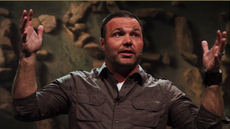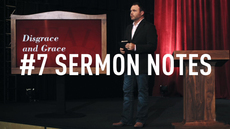From the April 22 sermon “A Message to Seven Churches,” preached by Pastor Mark Driscoll out of Revelation 1:9-20:
The book of Revelation is about loving Jesus and the church. Despite John’s suffering, Jesus redirects John to the churches—the lampstands that reflect Jesus to the world. Jesus tells us to persevere in him, with his people; to worship him privately and publicly, with his people; and to serve and give to his church. If you aren’t, it’s due to fear. But Jesus says to fear not, for he is with us.
The Difference between a Critic and a Servant
Christ loves the church. Christ died for the church. Christ’s plan for the world is the church! It’s the church! And when Jesus shows up, he’s talking about the church! He’s not talking about anything else, but everything focused on the health, well-being, multiplication, provision for the church. I need your heart opened up not just for our church, but for all churches that know, and love, and serve Jesus.
The difference between a critic and a servant is this: they see the same problem, and they respond differently. You could show up in the church and say, “There’s a problem.” And a critic will say, “Therefore I’m going to criticize that, mock that, malign that, make fun of that.” And a servant comes along and says, “I’m going to fix that.”
You’re going to read with me in the ensuing weeks about seven churches, some of which are awesome, some of which are awful. There are horrible churches in here, too. And what God is calling John to do is not to be a critic of those churches, but to be a servant of those churches.
4 Things You Need to Know about Fear
I need you to know that fear is not something to be embraced. It’s not something to be, “Well, of course, I’m afraid. This could happen, this could happen. They could react in this way. I could suffer these losses. It would all be very difficult.”
Fear is not to be accepted. Fear is not to be accommodated. Fear is not to be explained. Fear is a sin to be repented of. Fear of anything or anyone, other than God, is a sin to be repented of, because the fear of the Lord is the beginning of wisdom.
Number one: Fear is an attempt at sovereignty. “I see and know all, and I’m freaked out.” You don’t see and know all.
Number two: Fear is vision without God. “I see the future. God’s not in it. God’s not for me. God’s not going to help me.”
Number three: Fear turns us into false prophets. “Oh, I’ve seen the future, and it’s horrendous.”
And number four: Fear preaches a false gospel. “Oh, there’s a hell out there: I’ll be single, I’ll be broke, I’ll be sick, I’ll be suffering, I’ll be struggling, all the things that John is enduring. So, there’s that hell, that functional, false, fearful hell, and then to get out of it, I need a false, functional savior. So, I need to hold onto my money. I need to control my life. I need to remove myself from community. I need to rebel against authority. I need to sin. I need to self-medicate. I need to self-justify. I need to turn Jesus into a therapist, so I can be glorified. And then I can live in this view of heaven before the resurrection, that I have in my imagination.”
And it’s all a false gospel. Heaven is out there. It’s the kingdom of God. It’s the resurrection of the dead. Between here and then is tribulation. And if you have a false view of hell and a false savior, you’ll end up saying and doing things whereby you’re worshiping someone or something to be your functional, false savior, deliverer, to make your future better, which just means you’re trying to be God! [. . .]
Do not fear. What’s holding you back from obeying Jesus? All of these things—persevering in Jesus, worshiping Jesus, serving Jesus’ church—under whatever is holding you back, it is fear, and God comes to you and says, “Do not fear. I’m with you.” And he models that, coming to put a hand on his friend, John.
And Jesus’ final words in Matthew 28:20, he says, “I am with you always to the very end of the age.” Don’t be afraid. Persevere in Jesus. Worship Jesus. Serve Jesus’ church. Give to Jesus’ church. Do not be afraid. You say, “Why? Because it’s all going to be fine?” I didn’t say that. “Because it’ll all get better?” I’m not promising that. Because Jesus is with you. And in that way, our life is not tribulation-free, but it is tribulation-proof.
Do Persevere in Jesus
Four big ideas we want to pull out of Revelation 1:9–20. Number one, do persevere in Jesus. That’s exactly what he says, that we will have, quote, “tribulation,” and that we should persevere. And he uses that language very importantly: “in Jesus.” For those who are in Jesus, the context of this life is tribulation. It is opposition. It is suffering, because I don’t know if you know this, we’re not in the kingdom of God yet.
Today, you’re going to get in your car and leave here, and you’re not driving to heaven. Right? We’re not there yet. We’re in the time between the times, where Jesus is victorious, but the new heaven, new earth, new Jerusalem have not yet been brought to bear. Jesus has not yet returned. His throne is not yet on the earth. The dead have not been raised. Things are not yet done.
And this requires perseverance, something that very few of us know very little about, if anything at all. We are an absolutely self-absorbed, narcissistic, consumer culture of immediate gratification, and it manifests itself in all kinds of addictions, and compulsions, and debts. Christianity requires perseverance, but we persevere in Jesus, he says. Jesus persevered for us, through suffering, opposition, strife, death, and Jesus takes up residence in us through the presence and power of the Holy Spirit, and then the life of Jesus is made possible through the Christian, by the power of the Holy Spirit.
When we persevere, we don’t persevere for Jesus. We persevere like Jesus. We persevere with Jesus. We persevere in Jesus. We persevere by the power and the presence of the person of Jesus. And here’s how John says it—and he’s a guy who’s been persevering a long time, at this point in his life, maybe seventy or eighty years, as a Christian, hated. He is now exiled, sent away, and he continues to persevere. He doesn’t doubt God. He doesn’t disbelieve God. He does not disown God. He does not disregard God. [. . .]
Perseverance is with Jesus and his people. That’s why the whole structure of Revelation 1, 2, and 3 is about Jesus and his people, that we are to persevere individually in Jesus and persevere collectively as Jesus’ people. And he says that there will be tribulation until the kingdom. You and I need to know that it doesn’t matter who we elect. It doesn’t matter how many wars we fight, how many dollars we spend, how many initiatives we back. Until Jesus returns, and the dead are raised, and those who have sinned are judged, and Satan and demons are bound, and hell is occupied, and the new heavens, earth, and Jerusalem are glorified, until that day, there will be trouble. There will be trial. There will be tribulation.
So, dear friend, don’t let it shock you; but, instead, let it compel you to persevere, to hang in there. Who do you want to be in fifty, sixty, seventy, eighty years? And John serves for us as an amazing example of one who persevered sixty, seventy, perhaps eighty years in Jesus, like Jesus, for Jesus, because of Jesus. And even though he had hard days, he was waiting for the one day when he would see Jesus face to face and hear, “Well done, good and faithful servant.”














